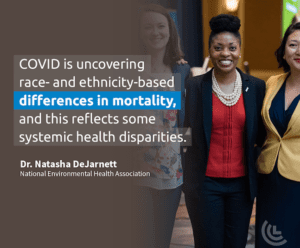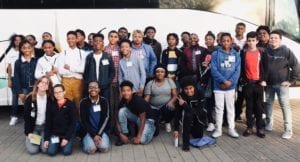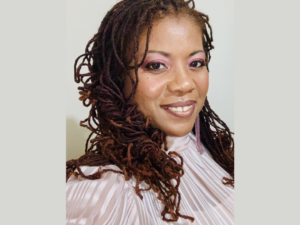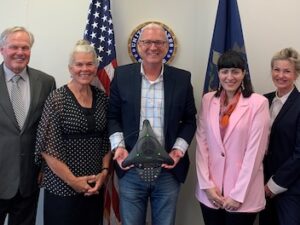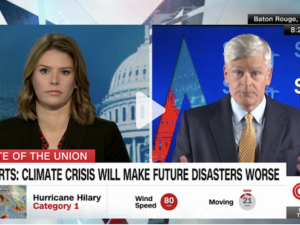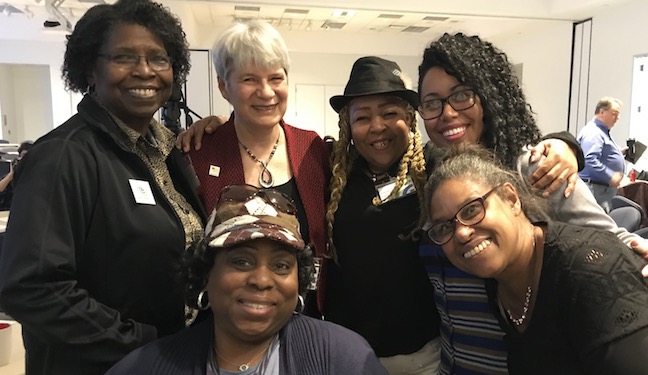
Members of the Good Hope Baptist Church in Pineville, Louisiana, including blog author (top right) and her mother, with CCL’s Madeleine Para (second from left)
By Princella Talley
As a resident of Central Louisiana, I know firsthand that the fortitude to acknowledge and adapt to unforeseeable and difficult circumstances is embedded in Louisiana culture. While the Bayou State is revered for its cultural heritage and cuisine, it is also a common point of reference for climate impacts, drastic inequities, and now, Covid-19.
The world-famous Mardi Gras experience is now cited as a key event where coronavirus could have silently begun spreading throughout the state, painting a newly grim picture of what has always been one of the most celebratory and anticipated experiences in Louisiana.
In March, a University of Louisiana at Lafayette study found that Louisiana had the fastest growth rate of new infections in the world. While people of all backgrounds in Louisiana are being impacted, recent data revealed that while African-Americans represented 33% of the state-wide population, we also accounted for at least 70% of deaths caused by the pandemic in early April.
“The pandemic experience in New Orleans has been harrowing. Our city is extremely social, an exuberant touchy-feely place that doesn’t lock down easy,” says Bart Everson, who is on staff at Xavier University of Louisiana and Lead of CCL’s Earth-Based Spirituality Action Team. “While some of us (such as myself) have actually managed to enjoy staying home, finding this a good time for reflection and inner work, many don’t have that privilege. We’ve seen once again how social and economic inequities are reproduced and exacerbated through harsh disparities in health outcomes. To put it bluntly, people of color are dying at twice the rate of white people.”
What’s happening in Louisiana is playing out on a national scale, too. As Dr. Natasha DeJarnett explained CCL’s May national call, “African Americans make up just over 13% of the population in the U.S., but are 52% of the coronavirus cases here in the U.S. and 58% of the coronavirus deaths. That is a disparity.” She explained a few factors driving that disparity, such as the presence of more air pollution in African American communities, less access to health care, and less access to telework options for jobs.
Those disparities are unacceptable, Bart says. “This is unacceptable to anyone who cherishes our common humanity. It underscores something we’ve known in CCL for a long time: the climate crisis also has its harshest impacts on the communities that are already the most precarious and vulnerable. Personally, this strengthens my resolve to continue making connections between our politics, our practices, and our most deeply held values.”
As Louisiana continues into its phases of reopening, safety and health on the local level remains a top priority, especially in communities of color—and rightfully so. At a recent outdoor service I attended at Good Hope Baptist Church in Pineville, the sermon included the need for nonpartisanship to create healthier communities and a better world. Pastor Joseph Lewis said, “We have to take the best from both sides and come together to do what’s best for our state and our nation as an informed citizenship. Instead of focusing on division, we should put partisan politics aside and come together in unity. United we stand. Divided we fall.”
Applause filled the parking lot for this message from the same pastor who came to pray for the safe travel of 47 youth and congregation members (many pictured below) en route to Houston for CCL’s Third Coast Regional Conference in February.
In moments like these, I remember that so much beauty remains in the midst of these uncertain times. Hope can often be felt in the conversations, countless smiles, and daily waves to strangers from 6 feet (or more) away.
And sometimes, hope is found in a box of cookies. Will Koren, a group leader in CCL’s New Orleans chapter, has been battling a presumed case of COVID-19 since March 3. “Throughout these 80+ days alone in my apartment, there has been one saving grace: the constant outpouring of support from my family and friends, as well as our incredible community of advocates in New Orleans and throughout all of Citizens’ Climate Lobby,” Will says. “Over the first two months alone I received countless calls per day from individuals simply checking in, or to see if I needed anything from the store. One night in late March, I even received a delivery of freshly baked cookies with a handwritten card reading, ‘Get well Soon – XOXO – Your CCL Third Coast Friends.’”
Beyond the one-on-one support for each other described by Will, there are larger shifts in political tones that call for solidarity and a reawakened spirit of grassroots organizing.
Ongoing state-wide coalition building in Louisiana and CCL’s Third Coast family has kept me hopeful. I’ve heard many things, but not once have I heard someone say that it is time to give up on our communities or our climate. I believe that we are all looking to one another as we work toward a sustainable and more resilient future.
Most recently, Third Coast Regional Coordinator Susan Adams and I attended a virtual meeting with middle school teachers in Alexandria, Louisiana. They mentioned ways in which the work we do is so critical for the well-being of tomorrow’s leaders and thanked us. But we are even more thankful to them for their partnership to find solutions that will help our communities to thrive instead of merely surviving.
What we have in Louisiana is not just resilience—it is family resilience. We accept what makes us vulnerable and trust our lived experiences to find opportunities that will keep us moving forward. Through faith and love, we remain committed to protecting the planet and people. As Will said, every part of our work shows that “no matter who you are, you matter. Your life matters, and we are not going anywhere.”
As we continue to pool together our knowledge and resources, I thank everyone in Louisiana and Third Coast for demonstrating that even when we cannot be together, we are never alone.
Princella Talley is a Development Associate and Diversity Outreach Coordinator on CCL’s staff.

